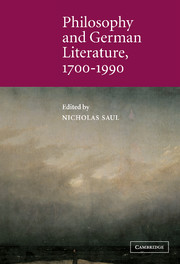Book contents
- Frontmatter
- Contents
- Contributors
- Acknowledgements
- List of abbreviations
- Introduction: German literature and philosophy
- Chapter One Criticism and experience: philosophy and literature in the German Enlightenment
- Chapter Two The pursuit of the subject: literature as critic and perfecter of philosophy 1790–1830
- Chapter Three Two realisms: German literature and philosophy 1830–1890
- Chapter Four Modernism and the self 1890–1924
- Chapter Five The subjects of community: aspiration, memory, resistance 1918–1945
- Chapter Six Coming to terms with the past in postwar literature and philosophy
- Bibliography
- Index
Chapter Five - The subjects of community: aspiration, memory, resistance 1918–1945
Published online by Cambridge University Press: 22 September 2009
- Frontmatter
- Contents
- Contributors
- Acknowledgements
- List of abbreviations
- Introduction: German literature and philosophy
- Chapter One Criticism and experience: philosophy and literature in the German Enlightenment
- Chapter Two The pursuit of the subject: literature as critic and perfecter of philosophy 1790–1830
- Chapter Three Two realisms: German literature and philosophy 1830–1890
- Chapter Four Modernism and the self 1890–1924
- Chapter Five The subjects of community: aspiration, memory, resistance 1918–1945
- Chapter Six Coming to terms with the past in postwar literature and philosophy
- Bibliography
- Index
Summary
The cultural transformations associated with the collapse of the Wilhelmine empire in 1918 affected German literature and philosophy in quite distinct ways. Formal philosophy, lodged in the universities, was among the most conservative institutions in German society and one that underwent little change, despite the social upheaval, while creative literature grappled with profoundly transformative and avant-garde dynamics. Consequently it is not surprising to find literary discourse in the Weimar Republic more supple and imaginative than philosophical writing, and it is above all in literature, in the critical statements by authors (rather than by professional philosophers), and in the judgements of literary critics that one finds an ongoing working-through of the fundamental problems of the day.
Nineteenth-century poetic realism had measured the shapes of the objective world, both society and nature, and thereby rethought the category of totality inherited from classical philosophy. Turn-of-the-century modernism directed its attention to the inner world of the subject, its anxieties and aspirations, and the limits of its capacity to perceive the world around it. Yet notwithstanding a sense of a growing estrangement between subject and object, Wilhelmine culture was able to maintain a superficially cohesive landscape of meaning, no matter how fraught with neo-Kantian dualities: the simultaneity and co-existence of an isolated individuality and its reified, natural-scientific environment.
- Type
- Chapter
- Information
- Philosophy and German Literature, 1700–1990 , pp. 197 - 244Publisher: Cambridge University PressPrint publication year: 2002



